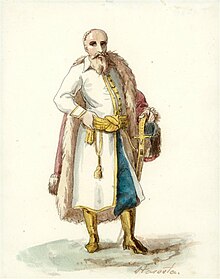Wójt
[1] In medieval Poland, a wójt (advocatus in documents written in Latin) was a hereditary (later elected) head of a town (under the overlordship of the town's owner – the king, church, or noble) or other area of settlement, which was established on or transferred to the Magdeburg rights, as well as the head of the local court (in Latin capitaneus).
It this respect, a wójt was the head of the territory called "wójtship [pl]" (Polish: wójtostwo; Lithuanian: vajtija, vaitystė; Latin: advocatia).
From this title derive surnames such as Wójtowicz/Voytovych, Starovoyt, Starovoytov, Voytenko, Voitiuk, and Voytov.
A wójt suggests the candidate for the position of gmina treasurer, for rada to accept.
[2] Wójt or his representative has an obligation to reasonably promptly address questions and requests formally submitted by rada members.

